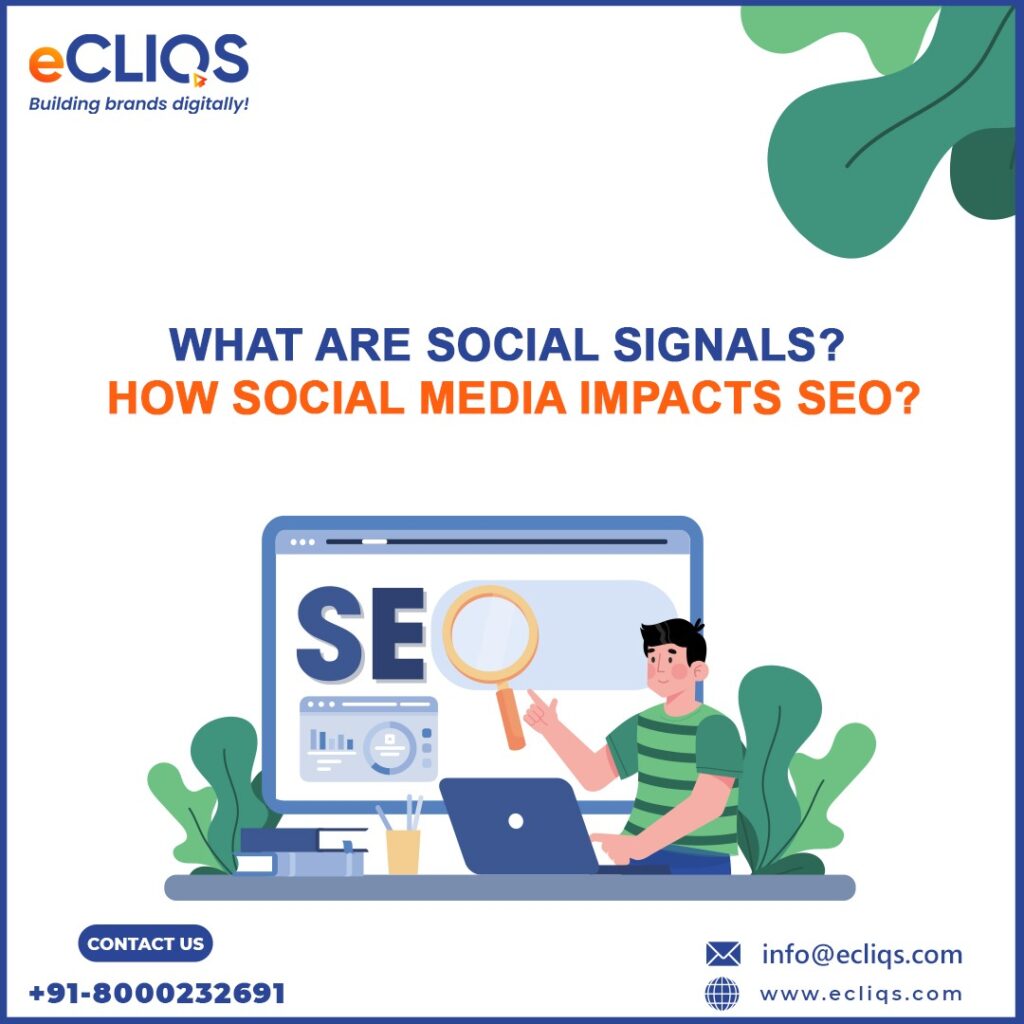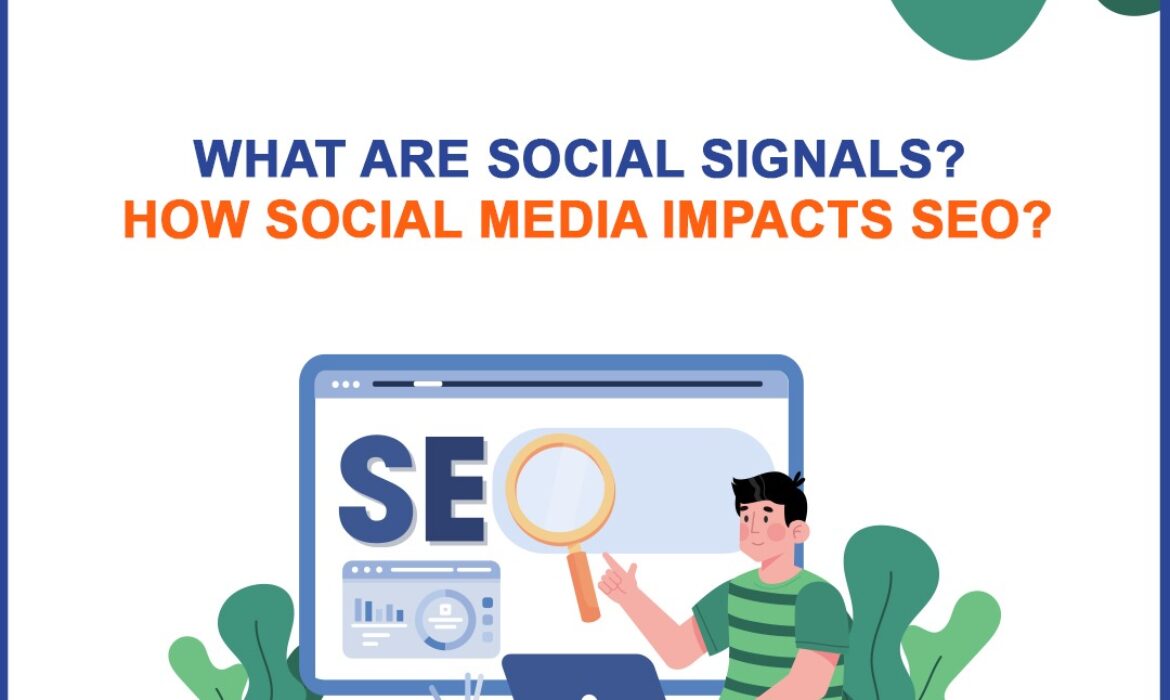SEO is interdisciplinary, which means that working on other aspects of our digital marketing strategy might help our web pages perform better in the SERPs. This includes your social media strategy and efforts to increase the social signals on our websites.
The relationship between social signals and SEO is indirect, therefore improved social signals will not result in higher-ranking positions. However, our attempts to boost our social media presence are undoubtedly tied to our SEO efforts, which is why the relationship is critical for all digital marketers to harness.
This guide will explain the principles of that relationship. Continue reading to learn more about how social signals affect SEO and ranking, as well as how to optimize them.

What are Social Signals?
Social signals refer to any interactions with a social media profile or its content. These interactions are just social media engagement in social media marketing, but in SEO, they are signals that assist search engines like Google evaluate the identity, popularity, and dependability of a user, profile, or post.
When you consider all of the different social media platforms available, numerous measures can be classified as social signals. Here are a few of the most popular by platform:
- Facebook: Follows, likes, dislikes, comments, shares, views
- Instagram: Follows, likes, shares, favorites, save.
- Twitter: Follows, Tweets, Retweets, Quote Tweets, replies
- Pinterest: Follows, pins, views
- LinkedIn: Connections, likes, comments, shares
- Reddit: Upvotes, comments
How do Social Signals impact SEO?
The truth is that studies and experiments and been conducted on SEO practices to determine the precise influence of social signals on SEO performance. Although there is a significant dispute in the industry, we can draw some strong conclusions regarding the indirect impact of social signals on ranking based on how confirmed ranking variables align with a website’s social media profile.
Social Media Profiles:
Google indexes social media profiles, so they will appear in search results. And, because Google wants to connect websites to their social media accounts, we can be certain that Google is looking for signals that link our websites to specific profile URLs.
Although less significant than ranking for your goal keywords, branded search results are critical to your SEO reputation management approach. If you Google your company name, your Facebook, LinkedIn, or Twitter profile will most certainly appear on the first page.
For Twitter, Google displays the three most recent tweets in the SERP (notice that Google does not display likes or retweets). A strong social media presence mirrored in the SERPs can assist in strengthening your audience’s trust in your brand, resulting in more clicks in the future if they find your web pages through organic search.
More Social Shares:
Backlinks have always been the most essential ranking criteria in search engines. However, when a person Tweets a link back to a web page, it does not truly transmit any link equity to your website, as a backlink on a web page would.
However, having your content shared and spread on social media will result in increased traffic to your web pages, more eyes on your content, and a higher likelihood that a user will find the content interesting and link to it. Being seen is the first step towards becoming bonded. Social media is an excellent approach to reaching a broader audience, therefore it may be part of any link-building plan.
Quality Content:
Assume a web page has been shared thousands of times via social media. Among those thousands of shares, there might be hundreds of thousands of likes, comments, and interactions. If a web page receives that much social proof, it most certainly includes useful content for the user. Web pages that score well in search results frequently include strong social media signals. However, correlation does not imply causation, thus there is no reason to believe that Google is using such social signals to assess quality and set ranks.
However, Google, like social media, rewards quality material. After all, its algorithm is based on Expertise, Authoritativeness, and Trust (EAT). Creating exceptional content will help you enhance your exposure and performance in both digital channels, as long as you share it on social media and optimize it for organic search.
Tips to improve your Social Signals for SEO
Because of the linkages made above, investing time in improving your social signals can benefit your SEO and other aspects of your digital marketing approach.
So, here are some strategies for enhancing your social signals to generate those ancillary benefits and increase your website’s total online visibility.
Linking your website & profiles:
As previously announced, Google wants to connect websites to social network accounts.
To make things easier, ensure that your website links to your social media profile pages and vice versa. This is a basic yet important step. Previously, SEOs used social media schema to interact directly with Google about their social media pages, however, Google no longer supports this schema type. Make it easy for Google to automatically identify the connection by using reciprocal linking. However, you don’t want links to social profiles on your homepage diverting attention away from your CTA buttons or lead generation forms. As a result, we recommend that you include social media connections in your website’s footer.
These links may help improve your user experience. Whether a person comes across your website or your social media page first, you want to make it as simple as possible for them to find additional essential URLs related to your company.
Optimize your social profiles:
On-page optimization can help your social media profile pages in the same way that it does for a web page or blog article.
Including target keywords in your About Us, Services, Products, or other editable portions of your social media profile might assist Google in comprehending your website’s relationship to those terms. It’s critical to complete every element of your profile since Google will crawl and render the content of these pages to determine what your company is all about. Each field allows you to enter additional crucial keywords linked to your business.
Claim your knowledge panel:
Google Knowledge Panels are a SERP feature that compiles all of the most important information about a brand for users, including social network accounts. They typically rank for branded searches or when someone searches for your company name.
Google automatically develops Knowledge Panels, thus there is no way to apply for one if your brand does not yet have one. However, if your company’s Knowledge Panel appears, make sure to claim it. This allows you to communicate more directly with Google about the information that is stored there.
Promote regularly:
If you routinely create content on your website, such as blogs, articles, or ebooks, you should also promote it on your social media profiles. The more posts and material you share on social media networks, the more likely you are to receive likes, comments, shares, and engagements.
You may use social media management tools to schedule and automate posts to your Twitter, Facebook, LinkedIn, and Instagram accounts. If you haven’t yet hired a social media manager, you should think about doing so or outsourcing to an agency.
Here are some suggestions for discovering ways to share your website material daily:
- Include links to your website’s newest content as soon as it is published.
- Post and link to any updated content that gives new or improved information to users.
- When the topic is mentioned in the news, in conversations, or in trending topics in your industry, share and link to relevant content on your website.
- When a person comments with a question about a certain topic, service, or product, provide a link to further related content on your website that addresses their query.
Add social plugins:
Website users are more likely to share content when it is simple to do so.
Adding social plugins to your content management system allows website visitors to easily share your high-quality material on their social network profiles.
Make your content clickable:
Use Open Graph tags and Twitter cards to make your web pages more interesting for social media users when they’re shared. These are just metadata elements that affect how your web content appears when shared on social networking networks.
Actively respond to comments and shares:
Being “active,” on social media, is part of enhancing your social signals. This includes responding to comments and shares, as well as demonstrating to users that your profile is administered by a genuine person. Actively reacting to comments and shares may also result in more opportunities to share relevant connections to other pages on your website with users.
If you are preoccupied with other aspects of your business, consider hiring a social media marketing manager or outsourcing your social media chores to an agency.
Final Words
While social media continues to play an important part in SEO, simply sharing links to your website is insufficient. It is vital to communicate with your audience and build relationships for them to share your social media material.
Schedule a session with us if you need SEO or social media marketing assistance. Visit our website and drop a message for a consultation call. Let us take your business to new heights together!



